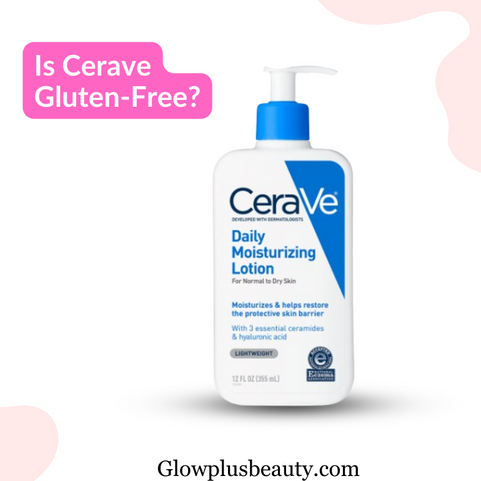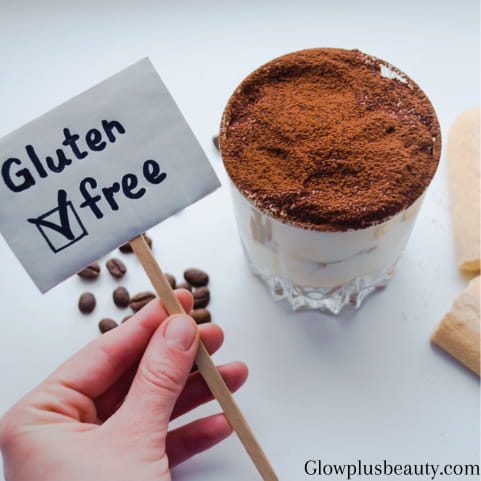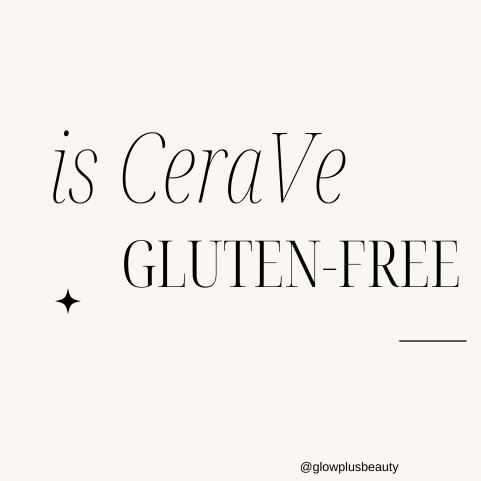Is CeraVe Gluten-Free

Imagine this: you have just found the perfect moisturizer for your skin type. It’s hydrating, soothing, and gentle. You love how it makes your skin feel soft and smooth. Every day, you’re eagerly looking forward to using it.
But then you notice something on the label: it contains gluten. You are shocked and confused. You have celiac disease or gluten sensitivity, and you know that gluten can cause serious problems for your health.
You wonder: can gluten in skincare products harm you? Do you need to switch to a gluten-free moisturizer?
If you have ever been in this situation, you are not alone. Many people with gluten-related disorders are concerned about the safety of their skincare products.
They want to know if gluten can be absorbed through the skin, or if it can be accidentally ingested from lip products or hand creams.
They also want to know which brands are gluten-free and trustworthy.
In this article, we will answer these questions. We will focus on one of the most popular skincare brands in the market: CeraVe.
We will explain what CeraVe is, what ingredients it uses, and whether it is gluten-free or not.
We will also provide some tips on how to choose gluten-free skincare products and avoid cross-contamination.
By the end of this article, you will have a better understanding of CeraVe and its gluten-free status, and you will be able to make informed decisions about your skincare routine.
Let’s get into it.
Related post:
Does CeraVe have Parabens? “Uncovering the Truth”
Is CeraVe Cleanser Halal For Muslims?
Is CeraVe Foaming Facial Cleanser Water Based Or Oil Based?
CeraVe Hydrating Cleanser vs. CeraVe Foaming Cleanser: A Complete Comparison
What is gluten and why does it matter?

While discussing whether is CeraVe gluten-free; it is crucial to know what gluten is.
Simply, Gluten is a protein found in wheat and other grains like barley and rye. In skincare products, gluten is often included for its moisturizing and conditioning properties.
It can help create a smooth texture in creams, lotions, and other cosmetic formulations.
But the good news is that gluten is generally considered safe for those without gluten sensitivities or allergies and for people with gluten-related disorders, such as celiac disease or dermatitis herpetiformis.
In such cases, only accidental ingestion or absorption of gluten through the skin could lead to adverse reactions; otherwise, it is okay to use topically.
What ingredients in cosmetics contain gluten?
The question arises: How do I Find Gluten in skincare Products?
In cosmetics, gluten-containing ingredients can sometimes be present. It’s important to note that not all cosmetics contain gluten, and many manufacturers now offer gluten-free options.
However, if you’re concerned about gluten in cosmetics, here are some ingredients to watch for:
- Cyclodextrin
- Dextrin
- Dextrin Palmitate
- Hydrolyzed Malt Extract
- Hydrolyzed Oat Flour
- Hydrolyzed Vegetable Protein
- Hordeum Vulgare (barley)
- Triticum Vulgare (wheat)
- Secale Cereale (rye)
- Avena Sativa (oats)
- Wheat Germ Oil
- Wheat Protein
- Wheat Starch
- Oat Kernel Extract
- Oat Kernel Oil
- Oat Bran
- Barley Extract
- Barley Flour
- Malt Extract
- Maltodextrin
- Maltose
- Phytosphingosine Extract
- Yeast Extract
- Hydrolyzed Wheat Protein
- Hydrolyzed Wheat Starch
- Hydrolyzed Wheat Gluten
- Hydrolyzed Barley Protein
- Hydrolyzed Rye Protein
- Hydrolyzed Oat Protein
- Vitamin E (if derived from wheat germ)
Is Cerave Gluten Free?

To know the truth, I decided to do some research and find out.
I contacted the company and asked them about their gluten policy. Here’s what they said:
“Thank you for reaching out to us. We do not use gluten in our CeraVe products, but we cannot assure that they are completely gluten-free. There may be some gluten in the raw materials or from different suppliers. Please check with your healthcare provider before using them.”
Hmm, not very reassuring, right? Basically, they are saying that they don’t intentionally put gluten in their products, but they can’t guarantee that they are gluten-free either.
They also say that the ingredients may change, so the gluten status of the products may vary.
This means that you have to check the labels every time you buy a new product or a new batch of an old product. And even then, you can’t be sure that there’s no gluten in them
Some Cerave products are gluten-free
At first, I was disappointed by this answer, but I also found some good news. According to the company’s website, CeraVe does have four products that are confirmed as gluten-free by a third-party laboratory. These products are:
- CeraVe Hydrating Facial Cleanser
- CeraVe Foaming Facial Cleanser
- CeraVe Hydrating Cream-to-Foam Cleanser
- CeraVe Makeup Removing Cleanser Cloths
These products have been tested and found to contain less than 20 parts per million (ppm) of gluten, which is the threshold set by the FDA for gluten-free labeling.
However, these products are not labeled as “gluten-free” on the packaging, so you may need to contact the company or check the website to verify their gluten status.
All the other CeraVe products, including moisturizers, sunscreens, serums, eye creams, and more, are not tested or labeled as gluten-free and may contain gluten-derived ingredients or traces of gluten.
Do you need to worry about gluten in Skin Care Products?
The short answer is: probably not. But the long answer is: it depends. Let me explain.
Some experts say that gluten in skin care products is not a problem unless you accidentally swallow them or have a skin allergy to gluten.
Others say that gluten can be absorbed through the skin and trigger a reaction in people with celiac disease or gluten sensitivity. So, who is right?
Well, the truth is that there is not enough scientific evidence to prove or disprove either claim.
Here’s A Good News: Gluten cannot penetrate your skin, so applying gluten-containing products to your skin should not cause a typical celiac reaction unless you have open wounds or sores that allow the gluten to enter your bloodstream.
The Bad News: Skincare products with gluten can cause an allergic skin reaction, such as rash, hives, itching, or swelling if you have a wheat allergy or a gluten sensitivity.
This is different from celiac disease, which is an autoimmune disorder, not an allergy. Some people may have both celiac disease and a wheat allergy, which can make things more complicated.
How do I know if my skincare contains gluten?
How do you know if your skincare products are gluten-free?
It’s not always easy to tell, because gluten can be hidden in many ingredients that you might not recognize.
That’s why I decided to do some research and share with you some tips on how to identify gluten-free skincare products.
Here’s what I learned:
Read Ingredient Lists:
Check the ingredient list on the product packaging. Look for terms like “wheat”, “barley”, “rye”, and “oats”, as these are common sources of gluten. Also, be aware of less obvious sources like hydrolyzed wheat protein or wheat germ oil.
Look for Gluten-Free Certification:
Some skincare products are certified gluten-free. Look for labels or certifications from reputable gluten-free organizations. However, keep in mind that not all gluten-free products may carry a certification.
Contact the Manufacturer:
If the ingredient list is unclear or if you have any doubts, contact the manufacturer directly. Most companies provide customer service contact information on their websites. Ask specific questions about the gluten content in their products.
Check Online Resources:
Some websites and databases like mine ones; compile information about gluten-free skincare products. These resources can help you identify safe products or provide insights from others who may have similar concerns.
Avoid Common Sources:
If you are uncertain about a product and cannot find clear information, it might be safer to avoid products with common gluten sources, such as wheat germ oil or hydrolyzed wheat protein.
Always Patch Test:
If you have gluten sensitivities or allergies, consider doing a patch test before applying a new skincare product to a larger area. This can help you to find out any adverse reactions.
Don’t Forget To Stay Informed:
Product formulations can change, so it’s essential to stay informed about the ingredients in your skincare products. Check for updates on product labels or the manufacturer’s website.
Remember, if you have gluten-related health concerns, it’s crucial to consult with a dermatologist or healthcare professional for personalized advice. They can provide guidance based on your specific needs and help you find suitable gluten-free skincare options.
Final thought: is CeraVe gluten-free
So, is CeraVe gluten-free? After dissecting the ingredients, checking the company’s stance, and tapping into user experiences, it seems like; CeraVe is not an entirely gluten-free brand.
Additionally, CeraVe products are not certified gluten-free, and they may contain trace amounts of gluten from the raw materials or the manufacturing process.
Therefore, CeraVe products may not be suitable who need to avoid gluten in their skincare products.
If you are looking for gluten-free skincare products, you need to read the labels carefully and look for gluten-free certifications.
We hope this article has helped you understand CeraVe and its gluten-free status, and how to choose gluten-free skincare products.
And if you have any recommendations for gluten-free skincare products, please share them with me. I’m always looking for new products to try. Thanks for reading this post, and stay safe and healthy!
The post is about Is CeraVe gluten-free
You may also like:
Is Rare Beauty Foundation Water-Based, Oil-Based or Silicone-Based?
3 Ways To Identify If Is Fenty Foundation Water-Based Or Silicone-Based.
Is L’Oreal Infallible Foundation Water-Based Or Silicone Based?



